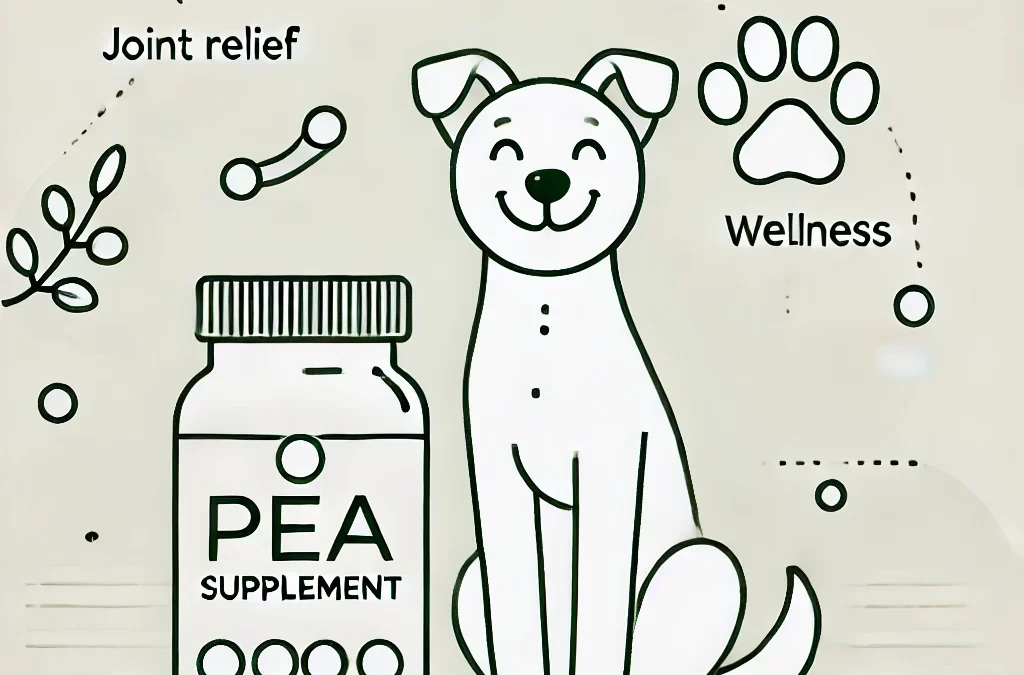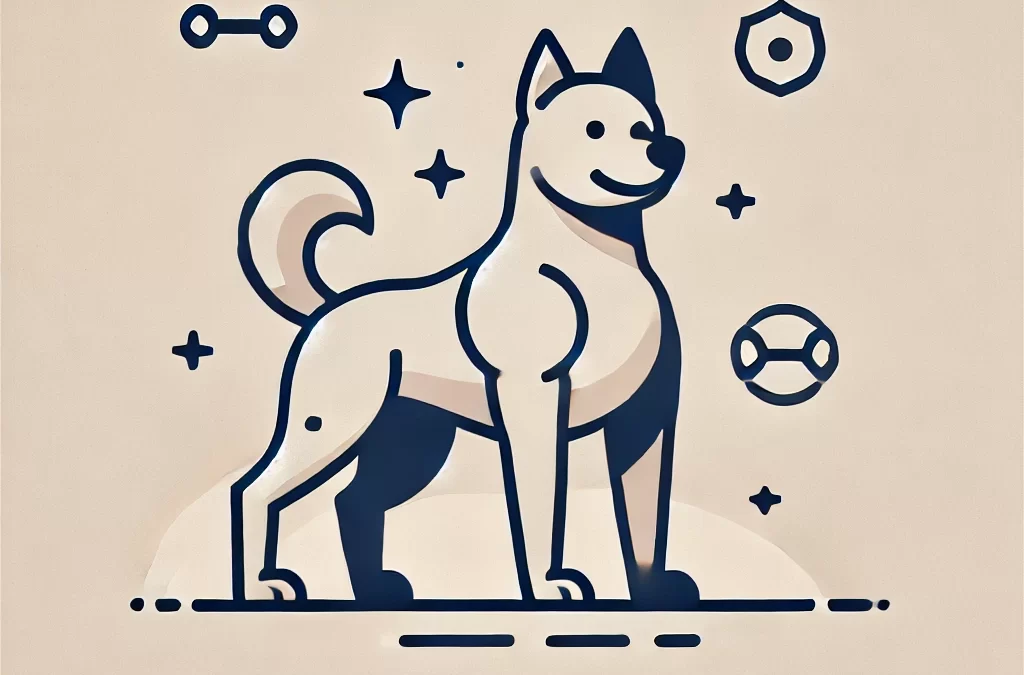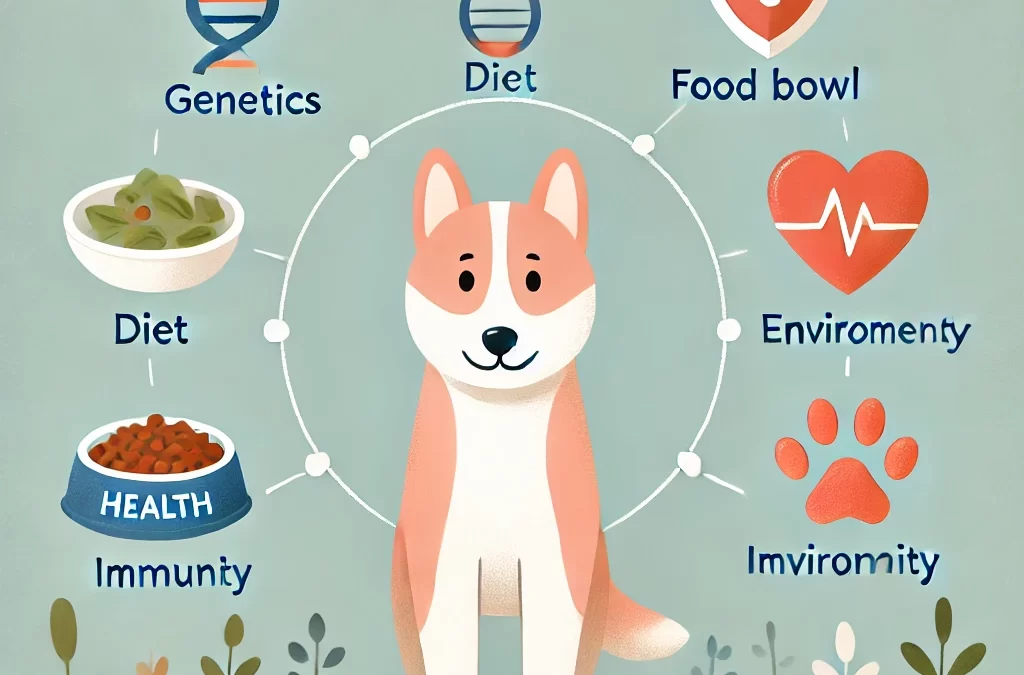
da TCMVET | 13 novembre 2024 | Alimentazione e salute
La palmitoiletanolamide, o PEA, sta guadagnando popolarità nel mondo della cura canina per le sue proprietà antidolorifiche e antinfiammatorie naturali. Originariamente scoperta come un'ammide di acidi grassi prodotta dal corpo, la PEA è un composto simile agli endocannabinoidi presente in vari tessuti, tra cui il cervello e il sistema immunitario. Questo composto unico, presente in alimenti come uova e soia, ha mostrato potenziali benefici nel supportare la gestione del dolore e ridurre l'infiammazione sia negli esseri umani che negli animali. Ma cosa significa per i nostri compagni canini?
Cos'è la PEA e perché è utile per i cani?
La PEA viene prodotta naturalmente nei corpi di umani e cani come risposta all'infiammazione e al dolore. Come composto endogeno, la PEA lavora con il sistema endocannabinoide per aiutare a modulare l'infiammazione e la percezione del dolore senza effetti psicoattivi. Ciò la rende un'alternativa più sicura per gli animali domestici rispetto ai farmaci tradizionali, soprattutto per un uso a lungo termine.
Principali vantaggi del PEA per i cani:
- Sollievo dal dolore: La PEA interagisce con i recettori del sistema nervoso, offrendo un mezzo naturale per ridurre il disagio.
- Proprietà Antinfiammatorie: Agisce sulla risposta immunitaria dell'organismo per ridurre l'infiammazione, il che può essere utile ai cani che soffrono di artrite, dermatite e altre condizioni infiammatorie.
- Improved Quality of Life: Alleviando il dolore e l'infiammazione, la PEA può migliorare la mobilità, i livelli di energia e il benessere generale.
Come funziona la PEA?
A differenza di altri antidolorifici, la PEA non blocca direttamente i segnali del dolore. Invece, agisce su quello che è noto come "effetto entourage", potenziando i processi naturali che regolano il dolore e l'infiammazione. Ecco uno sguardo semplificato al suo funzionamento:
- Interazione con i recettori dei cannabinoidi: La PEA interagisce indirettamente con i recettori dei cannabinoidi (recettori CB2) nel sistema immunitario, favorendo una risposta immunitaria equilibrata.
- Inibizione degli enzimi infiammatori: Inibisce gli enzimi che alimentano l'infiammazione, consentendo ai processi di guarigione naturali dell'organismo di funzionare in modo più efficace.
- Stabilizzazione dei mastociti: La PEA stabilizza i mastociti, ovvero cellule immunitarie che rilasciano istamine in risposta a lesioni o infiammazioni, riducendo il disagio correlato all'infiammazione.
Quali condizioni può aiutare a gestire la PEA nei cani?
La PEA può essere utile per i cani affetti da diverse patologie croniche:
- Artrite:I suoi effetti antinfiammatori possono aiutare i cani con infiammazioni e rigidità alle articolazioni.
- Skin Conditions: I cani affetti da dermatite cronica possono riscontrare sollievo dal prurito e dall'irritazione.
- Condizioni neurologiche:Alcune ricerche suggeriscono che la PEA potrebbe aiutare i cani affetti da dolori di origine nervosa calmando le cellule nervose iperattive.
- Recupero post-operatorio:Le proprietà antidolorifiche della PEA possono favorire una ripresa più rapida e una migliore gestione del dolore dopo un intervento chirurgico.
Utilizzo sicuro del PEA: dosaggio e precauzioni
La PEA è generalmente ben tollerata, ma è essenziale seguire un approccio sicuro:
- Consultare un veterinario: Parlate sempre con un veterinario prima di introdurre la PEA nella routine del vostro cane, soprattutto se sta assumendo altri farmaci.
- Inizia lentamente: Introdurre PEA in dosi più piccole e monitorare eventuali reazioni. PEA è in genere disponibile in compresse, polvere o forme masticabili, con raccomandazioni di dosaggio basate sul peso corporeo.
- Osservare e regolare: Monitorare la risposta del cane, regolando il dosaggio secondo necessità sotto la supervisione del veterinario.
Come scegliere l'integratore di PEA giusto per il tuo cane
Non tutti gli integratori PEA sono uguali. Quando selezioni un prodotto PEA, cerca:
- Purezza e qualità: Scegli integratori testati per la purezza e privi di contaminanti.
- Forma micronizzata: Questa forma di PEA è più biodisponibile, il che significa che viene assorbita più efficacemente dall'organismo del cane.
- Prodotti specifici per cani:Alcuni marchi sviluppano il PEA specificatamente per gli animali domestici, garantendo il dosaggio e la formulazione corretti.
Considerazioni finali: il futuro del PEA nella cura degli animali domestici
Poiché sempre più proprietari di animali domestici cercano opzioni naturali per migliorare la vita dei loro cani, PEA si distingue come un'aggiunta promettente. Il suo approccio multiforme al sollievo dal dolore e alla gestione dell'infiammazione può giovare agli animali domestici anziani, a quelli con patologie croniche e a qualsiasi cane che abbia bisogno di un supporto sicuro e delicato per il benessere.
Con la crescente ricerca e formulazioni più specifiche per gli animali domestici, la PEA potrebbe presto diventare un punto fermo nella cura olistica degli animali domestici. I suoi meccanismi unici e la comprovata sicurezza la rendono un'opzione praticabile e innovativa per supportare il comfort e la vitalità dei cani senza gli effetti collaterali dei farmaci convenzionali.

da TCMVET | 13 novembre 2024 | Alimentazione e salute
Proprio come gli esseri umani, gli animali domestici possono trarre grandi benefici dai probiotici, i "batteri buoni" che supportano la salute intestinale, l'immunità e il benessere generale. Mentre i probiotici commerciali sono popolari, le fonti naturali di probiotici stanno emergendo come un approccio efficace e olistico. Questo articolo approfondisce cosa sono i probiotici naturali, dove possono essere trovati e come possono migliorare la salute del tuo animale domestico in modo naturale.
1. Cosa sono i probiotici naturali per gli animali domestici?
- Definizione:I probiotici naturali sono batteri vivi e benefici presenti negli alimenti, nelle erbe e nelle piante fermentati naturalmente.
- Come funzionano:Questi microrganismi aiutano a bilanciare il microbioma intestinale, migliorano la digestione, potenziano la risposta immunitaria e possono persino avere un impatto positivo sull'umore.
- Differenza dai probiotici commerciali: I probiotici naturali provengono da alimenti integrali e sono meno elaborati, offrendo una soluzione più vicina alla natura.
2. Benefici dei probiotici naturali per gli animali domestici:
- Migliore digestione:I probiotici possono aiutare a scomporre il cibo, ad assorbire i nutrienti e a ridurre i problemi digestivi come gas o diarrea.
- Immunità più forte:Un microbioma intestinale equilibrato rafforza il sistema immunitario, aiutando gli animali domestici a combattere le infezioni in modo più efficace.
- Sollievo dalle allergie:L'assunzione regolare di probiotici può alleviare le allergie cutanee riducendo l'infiammazione nell'intestino, dove hanno origine molte risposte immunitarie.
- Umore e comportamento:La ricerca dimostra che esiste una correlazione tra salute intestinale e umore, suggerendo che i probiotici possono avere un effetto calmante sugli animali domestici.
3. Fonti di probiotici naturali per animali domestici:
- Yogurt e Kefir: Lo yogurt e il kefir semplici e non zuccherati sono ricchi di probiotici come Lattobacillo acidofilo E BifidobatterioPossono favorire la salute dell'apparato digerente se somministrati in piccole quantità sicure.
- Verdure fermentate: Piccole quantità di verdure fermentate come i crauti (non salati) possono apportare probiotici, ma è necessario introdurle con cautela.
- Aceto di mele:L'aceto di mele crudo contiene enzimi e batteri benefici, ma è opportuno diluirlo prima dell'uso per evitare disturbi digestivi.
- Erbe e organismi del suolo: Alcune erbe come la radice di tarassaco e la radice di cicoria contengono prebiotici, che nutrono i batteri benefici. Inoltre, i probiotici a base di terreno presenti nel terreno organico pet-safe possono supportare naturalmente la salute intestinale.
4. Come introdurre i probiotici naturali nella dieta del tuo animale domestico
- Inizia in piccolo: Introdurre piccole quantità e monitorare eventuali disturbi o reazioni digestive.
- Osservare e regolare: Se il tuo animale domestico sembra trarne beneficio, aumenta gradualmente la frequenza o la quantità secondo i consigli del veterinario.
- La coerenza è la chiave: Dosi regolari e costanti di probiotici naturali tendono a dare i risultati migliori, quindi trova un metodo che si adatti alla routine quotidiana del tuo animale domestico.
5. Quando considerare i probiotici naturali rispetto agli integratori
- Per animali domestici sensibili:Gli animali domestici che non tollerano bene gli integratori probiotici commerciali potrebbero rispondere meglio a fonti naturali.
- Trattamento post-antibiotico: Dopo un ciclo di antibiotici, i probiotici naturali possono aiutare a ripristinare il microbioma intestinale.
- Manutenzione quotidiana della salute:Se stai cercando un approccio preventivo, i probiotici naturali possono essere una scelta delicata ed efficace per la salute quotidiana.
6. Consigli di sicurezza e cose a cui fare attenzione
- Evitare gli additivi: Attenersi a fonti probiotiche semplici, non aromatizzate e non zuccherate, poiché additivi come zucchero e aromi artificiali possono essere dannosi per gli animali domestici.
- Consult Your Vet: Consulta sempre il veterinario, soprattutto se il tuo animale domestico soffre di problemi di salute preesistenti o allergie.
- Monitorare gli effetti collaterali:In rari casi, gli animali domestici possono manifestare una leggera diarrea o gonfiore mentre il loro organismo si adatta ai nuovi probiotici.
Conclusione:
I probiotici naturali offrono un modo olistico per migliorare la salute del tuo animale domestico, supportando la digestione, l'immunità e persino l'umore. Introducendo fonti sicure e naturali di probiotici, stai fornendo un percorso più naturale verso il benessere. Con pazienza e costanza, questi aiutanti naturali possono diventare una parte essenziale della routine del tuo animale domestico per una vita più felice e sana.

da TCMVET | 13 novembre 2024 | Cancro e tumori del cane
I noduli grassi, o lipomi, sono una delle escrescenze non cancerose più comuni nei cani, in particolare con l'avanzare dell'età. I proprietari di animali domestici spesso provano un senso di allarme quando scoprono questi noduli, ma la maggior parte dei lipomi è benigna. In questo articolo, esploreremo la sensazione che danno questi noduli, come distinguerli da altre escrescenze e suggerimenti su quando consultare un veterinario.
1. Cosa sono i grumi di grasso?
- Definizione di Lipomi: I lipomi sono depositi morbidi e grassi che si formano sotto la pelle, solitamente nei cani anziani o in sovrappeso.
- Luoghi comuni: Solitamente si riscontra sul busto, sulle ascelle e sugli arti, ma può presentarsi in diverse sedi.
- Causa: Sebbene le cause esatte non siano del tutto note, potrebbero essere collegate all'età, alla razza, alla genetica e al peso.
2. La sensazione dei grumi di grasso:
- Morbido e mobile: I lipomi sono generalmente morbidi e leggermente mollicci, e danno la sensazione di un grumo di pasta sotto la pelle. Sono facili da spostare con una leggera spinta, il che spesso li differenzia dalle escrescenze più dure e meno mobili.
- Non doloroso:A differenza delle cisti o degli ascessi, i lipomi non sono dolorosi, a meno che non premano su un nervo o un'articolazione.
- Texture coerente: I lipomi hanno solitamente la stessa consistenza, omogenea e pastosa.
3. Differenze tra i lipomi e altri tipi di noduli:
- Cysts: Spesso più solide, le cisti possono essere piene di liquido e talvolta presentare un punto centrale, a differenza dell'uniformità del lipoma.
- Ascessi: Di solito sono dolorosi e caldi al tatto, spesso accompagnati da rossore.
- Crescite cancerose: I noduli maligni possono essere più duri al tatto, spesso sono fissi in posizione e possono crescere rapidamente o in modo irregolare. I tumori possono avere una forma irregolare o essere sodi al tatto.
- Fibromi: Questi tumori benigni sono più sodi dei lipomi e meno mobili, ma solitamente sono innocui.
4. Quando dovresti preoccuparti?
- Tasso di crescita: Se un nodulo cresce rapidamente, cambia forma o diventa doloroso, è meglio consultare immediatamente un veterinario.
- Problemi di posizione: I noduli vicino alle articolazioni o nelle aree che influiscono sulla mobilità potrebbero richiedere la rimozione o il monitoraggio.
- Grumi multipli: In alcune razze è comune la formazione di lipomi multipli, ma se compaiono rapidamente nuovi noduli, è opportuno sottoporsi a un controllo veterinario.
5. Diagnosi dei lipomi:
- Esame veterinario:Un veterinario può confermare se un nodulo è un lipoma attraverso la palpazione.
- Aspirazione con ago sottile (FNA):Per una diagnosi più definitiva, l'FNA può raccogliere cellule dal nodulo per analizzarle, chiarendo se il nodulo è benigno o necessita di ulteriori accertamenti.
6. I lipomi devono essere rimossi?
- Quando è necessario un intervento chirurgico: In genere, i lipomi vengono lasciati stare, a meno che non causino disagio, limitino i movimenti o crescano eccessivamente.
- Opzioni minimamente invasive: In alcuni casi, metodi più recenti, come la liposuzione o le iniezioni di steroidi, possono aiutare a ridurre i lipomi.
7. Prevenzione e consigli per la salute per ridurre i lipomi:
- Mantenere un peso sano: L'obesità è un noto fattore di rischio per i lipomi.
- Controlli regolari: Visite veterinarie regolari consentono la diagnosi precoce e il monitoraggio di eventuali nuove escrescenze.
- Dieta equilibrata ed esercizio fisico:Una dieta equilibrata e un'attività fisica costante possono aiutare a prevenire l'obesità, riducendo così la probabilità di sviluppare lipomi.
Conclusione: Sebbene i noduli grassi nei cani possano essere preoccupanti, spesso sono innocui e facili da gestire. Comprendendo la sensazione, le cause e i sintomi dei lipomi, i proprietari di cani possono prendere decisioni informate sulla salute del loro animale domestico. Se non sei sicuro di un nodulo sul tuo cane, chiedi sempre un consiglio professionale per la tua tranquillità.

da TCMVET | 12 novembre 2024 | Cancro e tumori del cane
Per i proprietari di animali domestici che vogliono aiutare i loro cani a sviluppare massa muscolare magra, aumentare la forza o riprendersi da un infortunio, l'idea degli integratori per la costruzione muscolare potrebbe sembrare intrigante. Sebbene non siano uno standard per tutti i cani, questi integratori possono essere utili per alcune razze, cani ad alta energia, cani da lavoro e persino quelli in fase di recupero. Qui esploreremo i vantaggi degli integratori per la costruzione muscolare per cani, gli ingredienti chiave da cercare e i suggerimenti per scegliere prodotti sicuri ed efficaci.
1. Perché i muscoli sono importanti per i cani
Un sistema muscolare sano è fondamentale per ogni cane, non solo per quelli attivi o atletici. I muscoli aiutano a sostenere le articolazioni, migliorare la resistenza e mantenere la mobilità generale. Per i cani coinvolti in agility, caccia o altre attività ad alta intensità, muscoli forti possono aiutare a prevenire infortuni e migliorare le prestazioni. Inoltre, i cani più anziani, quelli che si stanno riprendendo da un intervento chirurgico e i cani con determinate condizioni come l'artrite possono trarre beneficio dal supporto muscolare per mantenere la forza e ridurre il disagio.
2. Chi dovrebbe prendere in considerazione gli integratori per aumentare la massa muscolare?
Gli integratori per l'aumento della massa muscolare non sono necessari per tutti i cani, ma possono essere utili per:
- Razze attive: Razze come i Border Collie, i Pastori Tedeschi e i Labrador sono naturalmente molto energici e prosperano con una routine di esercizi strutturata.
- Cani da lavoro: I cani da polizia, militari e da assistenza spesso necessitano di capacità fisiche migliorate.
- Cani anziani: I cani anziani possono perdere massa muscolare nel tempo. Gli integratori possono aiutare a mantenere il tono muscolare, che supporta la salute delle articolazioni.
- Cani in fase di recupero: I cani in fase di recupero da un intervento chirurgico o da un infortunio potrebbero aver bisogno di ulteriore supporto per recuperare forza e mobilità.
3. Ingredienti chiave da ricercare
Non tutti gli integratori per la costruzione muscolare sono creati uguali, quindi comprendere i benefici degli ingredienti può aiutare nella scelta di un prodotto di qualità. Ecco i migliori ingredienti che possono supportare la salute muscolare:
- Aminoacidi: I mattoni delle proteine, gli aminoacidi come L-carnitina e L-glutammina aiutano nello sviluppo e nel recupero muscolare. Sono essenziali per i cani che sviluppano o mantengono massa muscolare magra.
- Creatina: Sebbene comunemente associata al bodybuilding umano, la creatina è un composto naturale che può aiutare i cani a migliorare le prestazioni muscolari. È particolarmente utile per brevi esplosioni di energia, come lo sprint o l'allenamento di agilità.
- Acidi grassi omega-3: Questi grassi sani sono noti per ridurre l'infiammazione, il che può aiutare con il recupero dopo l'esercizio. Gli Omega-3 possono anche supportare la salute delle articolazioni, rendendoli una buona aggiunta a un integratore focalizzato sui muscoli.
- Fonti proteiche: Fonti proteiche di alta qualità come pollo, pesce o manzo forniscono nutrienti essenziali per la crescita e la riparazione dei muscoli. Alcuni integratori per la costruzione muscolare incorporano proteine in polvere disidratate.
- Composti di supporto articolare: Ingredienti come la glucosamina e la condroitina non favoriscono direttamente la crescita muscolare, ma favoriscono la salute delle articolazioni, fondamentale per i cani attivi che vogliono sviluppare e mantenere la massa muscolare.
4. Scegliere il giusto integratore per la costruzione muscolare
Quando scegli un integratore, tieni in considerazione questi suggerimenti per assicurarti di fornire al tuo cane il prodotto più sicuro ed efficace:
- Scegli prodotti specifici per cani: Alcuni integratori per l'aumento della massa muscolare umana possono essere dannosi per i cani. Cerca prodotti specificamente formulati per la fisiologia canina.
- Controlla gli ingredienti di alta qualità: Meno riempitivi, aromi artificiali o conservanti ci sono, meglio è. Un buon integratore dovrebbe essere ricco di ingredienti integrali.
- Parla con il tuo veterinario: Prima di iniziare a somministrare qualsiasi integratore, consulta il veterinario, soprattutto se il tuo cane soffre di problemi di salute preesistenti.
- Inizia lentamente: Introduci gradualmente qualsiasi nuovo integratore per osservare come risponde il tuo cane ed evita di somministrargli una dose maggiore di quella raccomandata.
5. Integrazione vs. dieta naturale
Sebbene gli integratori possano rappresentare un modo conveniente per aumentare la salute muscolare del tuo cane, una dieta bilanciata è fondamentale. Le diete ad alto contenuto proteico, tra cui carni magre, uova e alcuni pesci, possono supportare naturalmente la salute muscolare. Gli integratori sono più efficaci se abbinati a una buona alimentazione e a una corretta routine di esercizi.
6. Costruire muscoli attraverso l'esercizio e l'allenamento
Gli integratori da soli non possono costruire muscoli; una routine di esercizi ben strutturata è essenziale. Concentratevi su attività che coinvolgono tutto il corpo, come:
- Passeggiate o escursioni con pesi: Per i cani sani, attaccare uno zaino leggero può offrire una resistenza delicata.
- Allenamento di agilità: Stimola la flessibilità e rafforza la forza, mantenendo al contempo il cane mentalmente stimolato.
- Nuoto: Il nuoto è un esercizio a basso impatto, ottimo per la crescita muscolare e la salute delle articolazioni.
Conclusione: costruire un cane più forte e più sano
Gli integratori per la costruzione muscolare possono essere un'aggiunta preziosa per i cani che hanno bisogno di una spinta di forza, ma funzionano meglio se abbinati a un'alimentazione bilanciata e all'esercizio fisico. Scegliendo con cura integratori di alta qualità e tenendo informato il veterinario, puoi supportare la salute muscolare del tuo cane, assicurandoti che rimanga attivo, forte e pronto per le avventure della vita.

da TCMVET | 12 novembre 2024 | Cancro e tumori del cane
Il cancro è una delle malattie più difficili da gestire sia per gli esseri umani che per gli animali domestici, ed è particolarmente straziante quando colpisce i nostri amati cani. Ma capire perché e come si sviluppa il cancro nei cani può far luce sulla prevenzione e fornire informazioni sulla diagnosi precoce. Sebbene non esista un modo infallibile per prevenire il cancro, esploriamo i principali fattori che contribuiscono, le ricerche emergenti e i modi in cui possiamo contribuire a ridurre i rischi.
1. Genetica: l'influenza della razza e della storia familiare
Alcune razze hanno una maggiore predisposizione al cancro. Ad esempio, razze come Golden Retriever, Boxer e Rottweiler sono geneticamente inclini a sviluppare determinati tumori. La ricerca suggerisce che le mutazioni genetiche ereditarie svolgono un ruolo significativo in queste tendenze. Uno studio pubblicato in Genetica ed epidemiologia canina ha rivelato che alcune razze hanno tratti genetici in comune che le rendono più suscettibili ai tumori. Di conseguenza, la discendenza di un cane può aumentare il rischio, il che significa che i genitori di animali domestici di alcune razze devono essere particolarmente vigili con controlli veterinari regolari.
2. Fattori ambientali: cancerogeni e tossine quotidiane
I cani sono esposti alle tossine ambientali proprio come gli esseri umani. I colpevoli più comuni includono fumo passivo, alcuni prodotti per la pulizia, pesticidi e inquinamento. I cani, con il loro stretto contatto con pavimenti e superfici esterne, possono facilmente ingerire o inalare sostanze nocive, introducendo inconsapevolmente tossine nei loro corpi. Ci sono anche prove crescenti che mostrano una correlazione diretta tra l'esposizione a specifici cancerogeni e l'aumento dei rischi di cancro nei cani.
Informazioni utili: Per ridurre al minimo l'esposizione, prendi in considerazione la scelta di prodotti per la pulizia naturali, evita di fumare vicino agli animali domestici e assicurati che le aree gioco del tuo cane siano prive di pesticidi.
3. Dieta: il ruolo della nutrizione nella prevenzione del cancro
Ciò che mangia un cane può avere effetti profondi sulla sua salute, influenzando tutto, dalla funzione immunitaria alla salute cellulare. Cibo di scarsa qualità, ricco di riempitivi e additivi artificiali, può contribuire a mutazioni cellulari e infiammazioni, potenzialmente portando al cancro. D'altro canto, una dieta bilanciata ricca di antiossidanti, acidi grassi omega e proteine naturali può supportare la riparazione cellulare e le difese immunitarie.
Raccomandazioni dietetiche: Prendi in considerazione di passare a pasti di alta qualità, biologici o addirittura cucinati in casa, pensati per soddisfare le esigenze nutrizionali del tuo cane. Consulta sempre un veterinario per avere indicazioni sulla dieta migliore.
4. Influenze ormonali e salute riproduttiva
Gli ormoni sono potenti messaggeri chimici nel corpo e possono influenzare la crescita del tumore. Gli studi hanno dimostrato che la sterilizzazione o la castrazione all'età appropriata possono ridurre il rischio di alcuni tumori, come il cancro mammario o quello testicolare. Tuttavia, la tempistica di queste procedure è essenziale, poiché la sterilizzazione o la castrazione precoce sono state collegate a un rischio aumentato di altri tumori, come l'osteosarcoma.
Decisione equilibrata: Parla con il tuo veterinario del momento migliore per sterilizzare o castrare il tuo cane, poiché i tempi possono variare a seconda della razza e dello stato di salute individuale.
5. Infezioni e virus
Alcune infezioni e virus sono noti per essere cancerogeni. Nei cani, virus come il papillomavirus canino possono causare verruche che possono trasformarsi in tumori maligni in rari casi. Inoltre, le infezioni che causano infiammazione cronica possono portare a cambiamenti e mutazioni cellulari nel tempo, potenzialmente portando al cancro.
6. Invecchiamento: il fattore inevitabile
L'età è uno dei fattori di rischio più significativi per il cancro nei cani. Con i miglioramenti nelle cure veterinarie, i cani vivono più a lungo e con l'età aumenta la probabilità di cancro. Con l'invecchiamento delle cellule di un cane, i meccanismi per riparare i danni al DNA possono diventare meno efficienti, rendendo più facile il verificarsi di mutazioni cancerose.
Misure preventive e cambiamenti nello stile di vita per una vita più sana
Sebbene non tutti i casi di cancro siano prevenibili, alcuni aggiustamenti dello stile di vita possono aiutare a ridurre i rischi. Ecco alcune misure preventive che potrebbero promuovere la salute a lungo termine:
- Routine Veterinary Care: Controlli regolari aiutano a individuare eventuali escrescenze anomale o segnali premonitori.
- Scelte dietetiche sane: Scegli alimenti ricchi di nutrienti essenziali, privi di additivi e riempitivi artificiali.
- Mantenere un ambiente pulito: Utilizza prodotti non tossici ed evita di esporre il tuo cane a sostanze chimiche nocive.
- Fare esercizio fisico regolarmente: Mantenere il tuo cane attivo rafforza il suo sistema immunitario, fondamentale per combattere le malattie.
Conclusione: la conoscenza come nostra migliore difesa
Comprendere i fattori che contribuiscono al cancro nei cani può aiutarci a fare scelte consapevoli e, ove possibile, a ridurre il rischio. Sebbene la genetica e l'età siano al di fuori del nostro controllo, possiamo adottare misure per garantire che i nostri cani conducano vite più sane e più lunghe. Restando vigili, dando priorità a cure di qualità e promuovendo un ambiente privo di tossine, possiamo dare ai nostri cani le migliori possibilità di una vita libera dal cancro.





